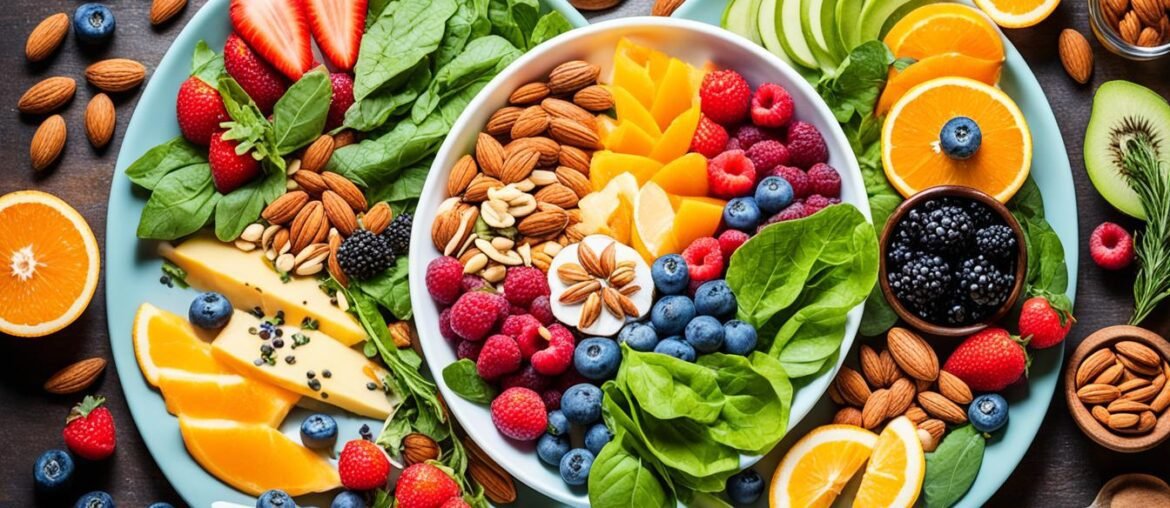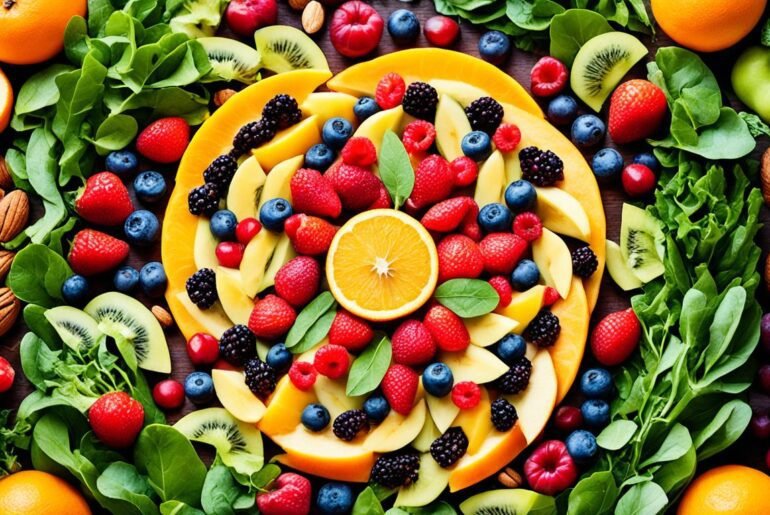Did you know that your skin is your largest organ? Yes, it’s true! Your skin not only acts as a protective barrier for your body, but it also plays a vital role in your overall health. While skincare products are important, the secret to glowing, youthful skin lies in the foods you eat.
A nutritious diet can work wonders for your skin, slowing down the signs of aging, reducing the risk of skin conditions, and improving its overall condition. By incorporating the right foods into your meals, you can nourish your skin from the inside out and achieve that enviable healthy complexion.
So, if you want to unlock the potential of your skin, join me as we explore the top foods for promoting skin health. From strawberries to kimchi, bone broth to shellfish, these skin-friendly foods are packed with essential nutrients and powerful antioxidants that can transform your skin from the inside out.
Key Takeaways:
- 1. Your diet plays a crucial role in maintaining healthy skin.
- 2. Certain nutrients are essential for skin health, such as selenium, zinc, omega-3 fats, and vitamins A, C, and E.
- 3. Consuming foods rich in these nutrients can slow signs of aging, reduce the risk of skin conditions, and improve skin moisture and elasticity.
- 4. Incorporating skin-boosting foods into your diet can help you achieve a healthy and radiant complexion.
- 5. A balanced diet and a healthy lifestyle are key to achieving and maintaining healthy skin.
Strawberries
When it comes to promoting skin health, strawberries are a powerhouse. These delicious berries are packed with skin-loving nutrients such as vitamin C, anthocyanins, phenolic acids, and flavonoids. Vitamin C, in particular, plays a vital role in protecting skin cells from oxidative damage and is essential for collagen production, which keeps the skin firm and supple.
Just one cup of sliced strawberries provides an impressive 108% of the Daily Value (DV) of vitamin C. Incorporating these bright red berries into your diet can give your skin a boost of antioxidants, helping to combat free radicals and promote a healthy complexion.
Whether enjoyed fresh, added to smoothies, or used as a topping for yogurt, strawberries are a tasty and nutritious addition to any skincare routine. Their natural sweetness makes them a popular choice for satisfying cravings while delivering a dose of skin-boosting benefits.
“Strawberries are not only a delicious treat but are also packed with skin-loving nutrients, including vitamin C. Adding these berries to your diet can help protect your skin from oxidative damage and support collagen production.”
Incorporating strawberries into your diet is a simple and delicious way to enhance your skin health. So go ahead, indulge in nature’s sweet treat and let your skin reap the benefits of these antioxidant-rich berries.
Benefits of Strawberries for Skin Health:
- Rich in vitamin C, which protects skin cells from oxidative damage and aids in collagen production
- Contains anthocyanins, phenolic acids, and flavonoids with antioxidant properties
- Helps combat free radicals and prevent signs of aging
- Supports a healthy complexion and promotes skin elasticity
| Nutrient | Amount per Cup of Strawberries | % Daily Value (DV) |
|---|---|---|
| Vitamin C | 84.7 mg | 108% |
| Fiber | 3.3 g | 13% |
| Folate | 40.6 mcg | 10% |
| Potassium | 233 mg | 7% |
Kimchi
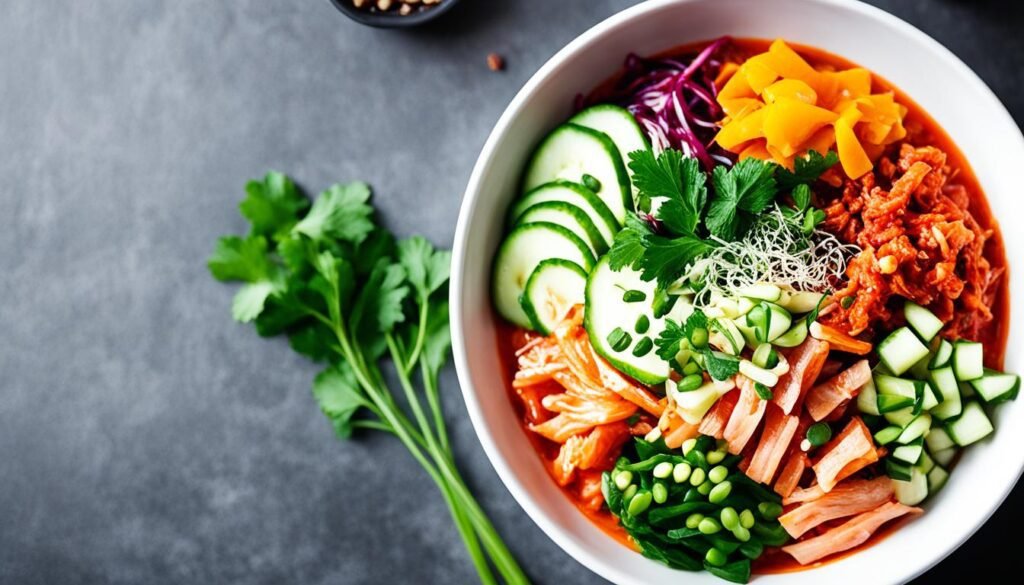
Kimchi, a fermented dish made with Chinese cabbage and other ingredients, is not only a delicious addition to your meals, but it also offers numerous benefits for skin health. This traditional Korean side dish contains probiotics and essential nutrients that promote a healthy complexion.
Probiotics, found in kimchi due to the fermentation process, are beneficial bacteria that support both gut and skin health. The gut and skin are closely linked, and maintaining a healthy gut microbiome can have a positive impact on your skin. By including kimchi in your diet, you can introduce these beneficial bacteria into your system, promoting a balanced microbiome and supporting skin health.
In addition to probiotics, kimchi is also rich in provitamin A and vitamin C. Vitamin C is a powerful antioxidant that helps protect the skin from oxidative damage and aids in the production of collagen, a protein that plays a key role in maintaining skin elasticity and firmness. Provitamin A, also known as beta-carotene, is converted into vitamin A in the body and helps nourish the skin from within. These nutrients work together to improve the overall health and appearance of your skin.
Incorporating kimchi into your diet can be a simple and delicious way to enhance your skin health. Whether enjoyed on its own as a side dish or added to various recipes, this fermented food provides probiotics and essential nutrients that can contribute to a glowing complexion.
Blood Oranges
Blood oranges are a delicious and nutritious fruit that can do wonders for your skin health. These vibrant citrus fruits are not only packed with flavor but also loaded with beneficial compounds that promote a radiant complexion.
One of the key nutrients found in blood oranges is anthocyanins. These compounds are powerful antioxidants that help protect skin cells from damage caused by free radicals. Anthocyanins also have anti-inflammatory properties, which can help calm and soothe irritated skin.
In addition to anthocyanins, blood oranges are rich in vitamin C. This essential vitamin plays a crucial role in the production of collagen, a protein that keeps the skin firm and youthful. Vitamin C also acts as an antioxidant, helping to protect skin cells against UV damage and environmental pollutants.
To reap the skin-boosting benefits of blood oranges, try incorporating them into your diet. You can enjoy them as a snack, add them to salads or smoothies, or even use the juice in marinades and dressings.
| Nutrient | Amount per 100g |
|---|---|
| Anthocyanins | 35-150 mg |
| Vitamin C | 43 mg |
| Fiber | 2.4 g |
| Calcium | 40 mg |
| Potassium | 181 mg |
By incorporating blood oranges into your diet, you can enjoy not only their sweet and tangy flavor but also their skin-loving benefits. So go ahead and indulge in these vibrant fruits to enhance your skin health and achieve a glowing complexion.
Sunflower Seeds
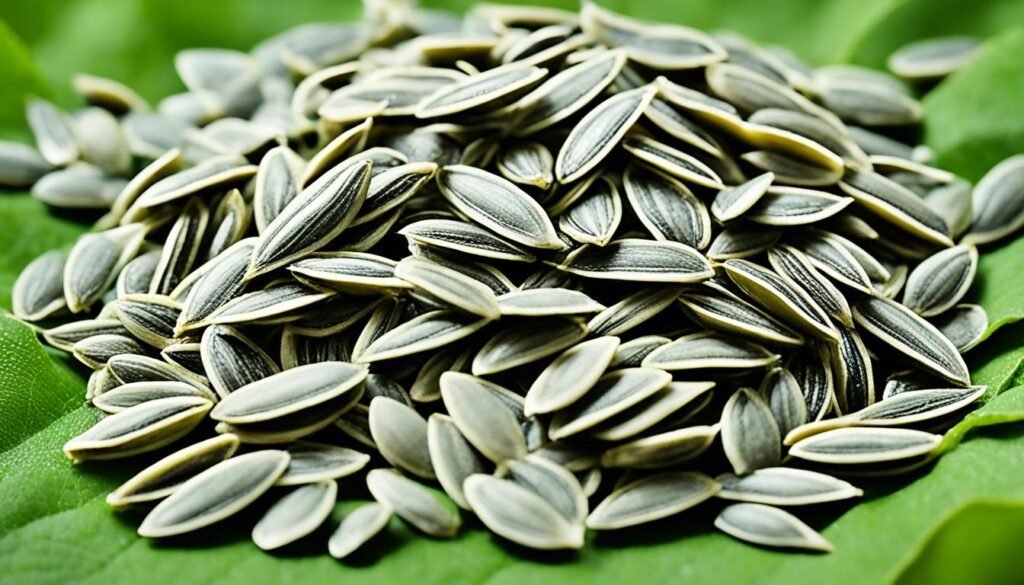
When it comes to promoting skin health, sunflower seeds are a nutritional powerhouse. These small, crunchy seeds are packed with protein, vitamin E, selenium, and zinc, making them an excellent addition to your diet.
Vitamin E is a powerful antioxidant that helps protect skin cells from sun damage and environmental stressors. It also regulates inflammation, promoting a calm and balanced complexion. Additionally, vitamin E contributes to the synthesis of collagen and elastin, two proteins crucial for maintaining skin elasticity and firmness.
Sunflower seeds are also high in selenium and zinc, two minerals essential for skin health. Selenium supports antioxidant defenses, helping to prevent oxidative damage and maintain a youthful appearance. Zinc plays a key role in wound healing, collagen production, and regulating oil gland activity.
Adding sunflower seeds to your meals or enjoying them as a snack can provide your skin with the essential nutrients it needs for a healthy, glowing complexion.
| Nutrient | Amount per 1 ounce (28g) | % Daily Value (DV) |
|---|---|---|
| Protein | 5.5g | 11% |
| Vitamin E | 7.4mg | 37% |
| Selenium | 18.6mcg | 27% |
| Zinc | 2.3mg | 15% |
Include sunflower seeds in your daily routine to nourish your skin from within and enhance its overall health.
Bone Broth
When it comes to promoting skin health, bone broth is a powerful ally. This collagen-rich liquid is packed with amino acids that are essential for collagen synthesis, the protein responsible for repairing and regenerating skin cells.
Collagen plays a vital role in maintaining the elasticity and firmness of the skin, helping to reduce the appearance of wrinkles and fine lines. By consuming bone broth, you can provide your skin with the necessary building blocks to support collagen production.
Additionally, bone broth is excellent for hydration, as it contains a high concentration of water and electrolytes. Proper hydration is crucial for maintaining skin health, as it helps to plump the skin and enhance its natural glow.
Include bone broth in your diet regularly to reap its skin-rejuvenating benefits. You can enjoy it as a warm and soothing drink, or incorporate it into various recipes for added flavor and nutrition.
Benefits of Bone Broth for Skin Health:
- Supports collagen synthesis
- Repairs and regenerates skin cells
- Enhances skin elasticity
- Reduces the appearance of wrinkles and fine lines
- Provides hydration for plump and glowing skin
How to Make Bone Broth:
- Start with high-quality bones, such as chicken, beef, or fish.
- Add vegetables, herbs, and spices for additional flavor.
- Cover with water and simmer for several hours until the bones release their nutrients.
- Strain the broth to remove any solids.
- Store in jars or containers in the refrigerator or freezer for later use.
By incorporating bone broth into your daily routine, you can nourish your skin from within and enjoy the benefits of a radiant and healthy complexion.
Organ Meats

When it comes to promoting skin health, don’t overlook the incredible benefits of organ meats. These nutrient-dense foods, such as beef liver, are packed with vitamins and minerals that are essential for maintaining healthy skin.
Beef liver is particularly beneficial for the skin due to its rich copper content. Copper is known to protect the skin against free radicals, reduce inflammation, and promote collagen maturation, which is crucial for maintaining skin elasticity and firmness.
In addition to copper, organ meats are also high in other skin-nourishing nutrients. For example, they are a great source of selenium, which plays a vital role in protecting the skin from oxidative damage and maintaining its overall health. Vitamin A and zinc are also abundant in organ meats, providing additional support for skin health.
Incorporating organ meats into your diet can be a fantastic way to boost your skin’s natural radiance and vitality.
| Organ Meat | Copper Content (mg per 100g) | Selenium Content (μg per 100g) | Vitamin A Content (IU per 100g) | Zinc Content (mg per 100g) |
|---|---|---|---|---|
| Beef Liver | 14.6 | 37.3 | 16,899 | 4.7 |
| Chicken Liver | 3.9 | 44.6 | 22,325 | 3.8 |
| Lamb Liver | 12.0 | 26.9 | 25,268 | 4.9 |
“Organ meats are like a skin elixir, rich in essential minerals and vitamins that can transform your complexion.” – Dr. Sarah Thompson, Dermatologist
Shellfish

When it comes to skin health, shellfish, particularly oysters, are a fantastic addition to your diet. They are packed with minerals such as zinc and selenium that play a vital role in maintaining healthy skin.
One of the key benefits of shellfish for skin health is their high zinc content. Zinc is crucial for regulating inflammation and wound healing, which can help combat skin conditions and promote the repair of damaged skin cells.
Additionally, shellfish, including oysters, are rich in selenium. Selenium acts as a potent antioxidant, protecting skin cells from oxidative damage caused by environmental factors like UV radiation and pollution.
Furthermore, shellfish are a great source of omega-3 fats, which have anti-inflammatory properties. These healthy fats help maintain the skin’s moisture levels, reduce inflammation, and promote overall skin health.
By incorporating shellfish into your diet, you can harness the skin-nourishing benefits of zinc, selenium, and omega-3 fats. Whether you enjoy them grilled, steamed, or as part of a seafood feast, shellfish can be a delicious and nutritious addition to your skin-boosting diet.
The Benefits of Shellfish for Skin Health:
- High in minerals like zinc and selenium
- Help regulate inflammation and promote wound healing
- Protect skin cells from oxidative damage
- Provide omega-3 fats with anti-inflammatory effects
“Incorporating shellfish into your diet can support healthy skin by providing essential minerals and omega-3 fats.” – SkinNutritionExpert
Broccoli
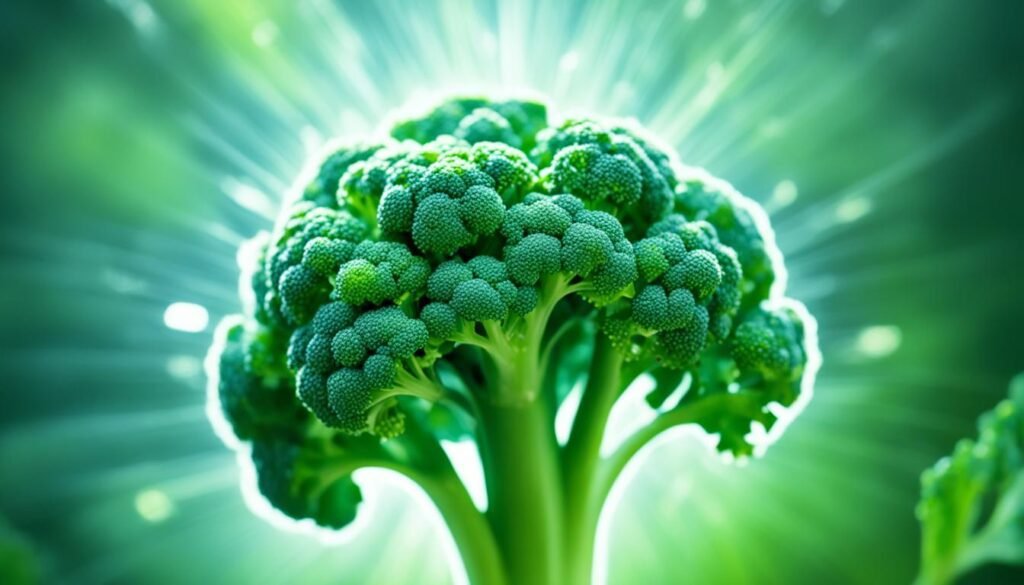
Broccoli is a powerhouse vegetable when it comes to promoting skin health. Not only is it packed with essential nutrients, but it also offers several benefits that can enhance the condition of your skin.
Fiber: Broccoli is an excellent source of fiber, which plays a crucial role in maintaining a healthy gut environment. A healthy gut is essential for proper digestion and nutrient absorption, both of which contribute to overall skin health.
Polyphenols: Polyphenols are antioxidants found in broccoli that possess numerous skin-protective properties. They work by inhibiting enzymes that break down collagen and elastin, two proteins responsible for maintaining skin elasticity. Additionally, polyphenols offer protection against UV damage and exhibit anti-inflammatory effects, helping to reduce redness and irritation.
If you want to improve the health and appearance of your skin, incorporating broccoli into your diet is a great way to start. Not only will it provide your body with the necessary fiber and polyphenols, but it also offers other essential vitamins and minerals that support overall well-being.
So next time you’re planning your meals, be sure to include broccoli as part of your skin-friendly diet.
Trout
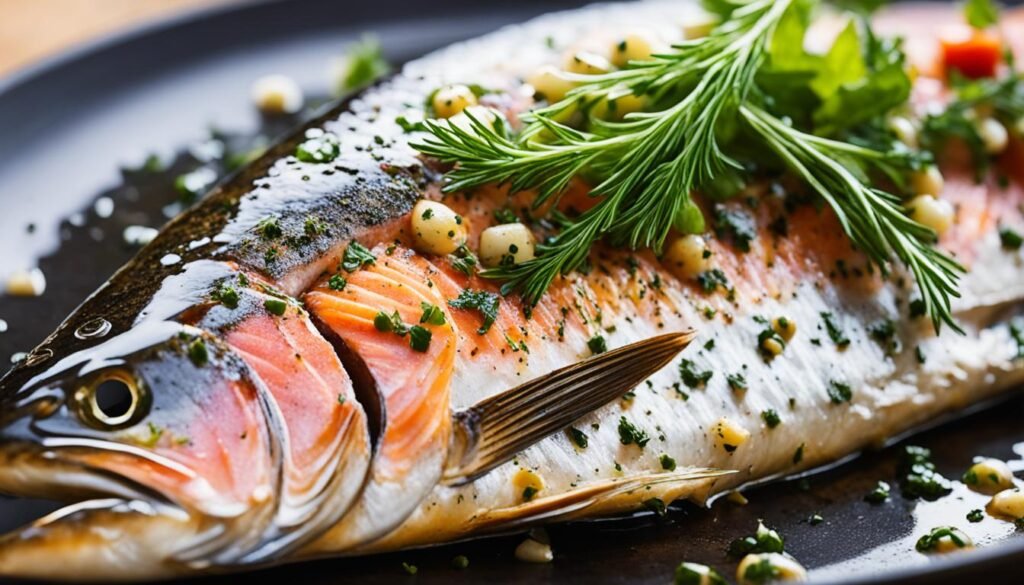
When it comes to promoting skin health, trout is a top contender. Not only is it a delicious addition to your diet, but it also offers a range of benefits for your skin.
One of the key nutrients found in trout is vitamin D. Vitamin D plays a crucial role in skin cell growth and function, helping to maintain the health and integrity of your skin. It also supports the production of collagen, a protein that keeps your skin strong and elastic.
In addition to vitamin D, trout is rich in omega-3 fats. These fats are known for their anti-inflammatory properties, helping to calm irritated skin and reduce redness. They also play a role in protecting against skin cancer and maintaining the overall health of your skin.
Trout is also a great source of zinc and selenium, two minerals that are essential for skin health. Zinc helps to regulate the production of oil in your skin, preventing clogged pores and breakouts. Selenium, on the other hand, acts as a powerful antioxidant, protecting your skin from free radical damage.
Lastly, trout is a high-quality source of protein, which is essential for maintaining the structure and integrity of your skin. Protein helps to repair and regenerate skin cells, keeping your skin looking youthful and vibrant.
By incorporating trout into your diet, you can nourish your skin from the inside out, reaping the benefits of its vitamin D, omega-3 fats, zinc, selenium, and protein content.
Watermelon
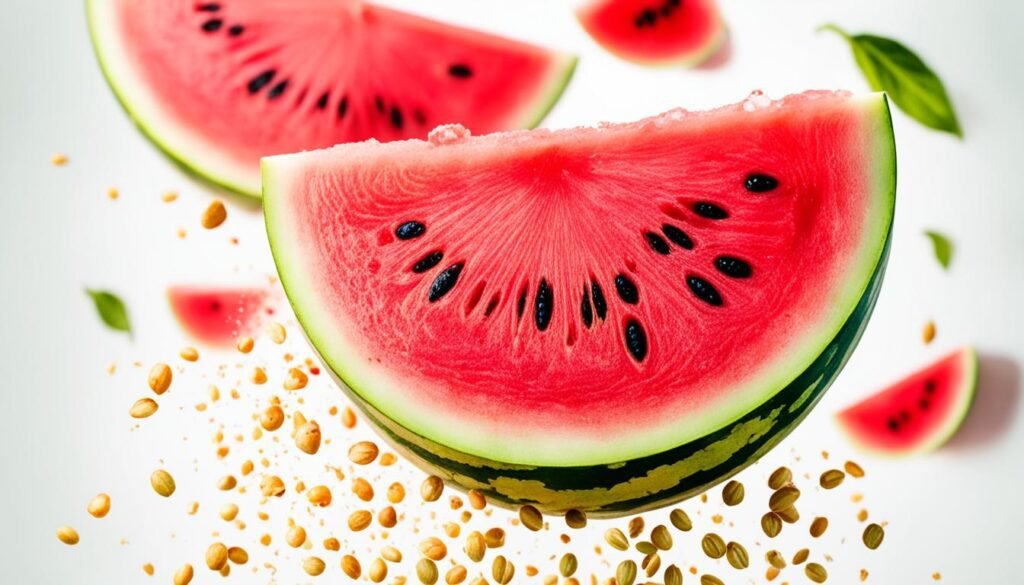
Watermelon is a refreshing fruit that not only quenches your thirst but also benefits your skin health. With its high water content of over 90%, watermelon is an excellent hydrator for your skin, promoting a healthy, glowing complexion.
In addition to its hydrating properties, watermelon contains essential nutrients that contribute to skin health. It is rich in vitamin C, a powerful antioxidant that helps protect the skin against oxidative damage caused by free radicals. Vitamin C also supports collagen production, helping to maintain skin elasticity and firmness.
Another beneficial component of watermelon is lycopene, a potent antioxidant that gives the fruit its vibrant red color. Lycopene helps protect the skin from UV damage, reducing the risk of sunburn and premature aging.
Furthermore, watermelon contains L-citrulline, an amino acid that helps promote healthy circulation. Improved blood flow to the skin can enhance its natural radiance and nourishment.
| Nutrient | Amount per 100g |
|---|---|
| Water | 91.45g |
| Vitamin C | 8.1mg |
| Lycopene | 4.5mg |
With its hydrating properties, vitamin C content, lycopene, and L-citrulline, watermelon is a fantastic fruit to include in your diet for healthy, vibrant skin.
Conclusion
By incorporating a diet rich in skin-boosting foods, you can nourish your skin from the inside out. These foods provide essential nutrients, antioxidants, and hydration to support a healthy and radiant complexion. The best part is, these foods are easily accessible and can be incorporated into your daily meals.
Consuming these skin-friendly foods can help slow down the signs of aging, reduce the risk of skin conditions, and improve overall skin health. From the vitamin C-rich strawberries to the hydrating properties of watermelon, each food brings its unique benefits to the table.
However, it’s important to remember that a healthy diet alone isn’t enough. A balanced lifestyle that includes regular exercise, enough sleep, and stress management is equally crucial. Taking care of your skin from both the inside and outside will help you achieve and maintain that healthy, glowing complexion you desire.
FAQ
What are the best foods for promoting skin health?
The best foods for promoting skin health include strawberries, kimchi, blood oranges, sunflower seeds, bone broth, organ meats, shellfish, broccoli, trout, and watermelon. These foods are rich in essential nutrients, antioxidants, and hydration that support healthy, radiant skin.
How do strawberries contribute to skin health?
Strawberries are rich in skin health-promoting substances like vitamin C, anthocyanins, phenolic acids, and flavonoids. Vitamin C protects skin cells from oxidative damage and is crucial for collagen production. Including strawberries in your diet can help improve skin moisture, elasticity, and overall health.
Why is kimchi beneficial for skin health?
Kimchi, a fermented dish made with Chinese cabbage and other ingredients, contains probiotics and nutrients essential for skin health, such as provitamin A and vitamin C. Probiotics and fiber from fermented foods support gut and skin health, as the gut and skin are closely linked.
What makes blood oranges good for the skin?
Blood oranges have a high concentration of anthocyanins, powerful antioxidants that protect skin cells from damage and have anti-inflammatory effects. They are also rich in vitamin C, which is essential for collagen production and protecting skin cells against UV damage.
How do sunflower seeds promote skin health?
Sunflower seeds are packed with protein, vitamin E, selenium, and zinc. Vitamin E protects skin cells from sun damage, regulates inflammation, and contributes to collagen and elastin synthesis. Sunflower seeds are also high in selenium and zinc, important minerals for maintaining healthy skin.
How does consuming bone broth benefit the skin?
Bone broth is a collagen-rich liquid that provides amino acids essential for collagen synthesis. Collagen helps repair and regenerate skin cells, contributing to a healthy complexion. Consuming bone broth also hydrates the skin and provides necessary amino acids for optimal skin health.
Why are organ meats beneficial for the skin?
Organ meats like beef liver are nutrient-dense and rich in vitamins and minerals important for skin health. Beef liver is a source of copper, which protects the skin against free radicals and promotes collagen maturation. Organ meats are also high in selenium, vitamin A, and zinc.
How do shellfish help improve skin health?
Shellfish, particularly oysters, are rich in minerals like zinc and selenium that support skin health. Zinc regulates inflammation and wound healing, while selenium protects skin cells from oxidative damage. Shellfish also provide omega-3 fats with anti-inflammatory effects.
Why is broccoli good for the skin?
Broccoli is a good source of fiber, vitamin C, and polyphenol antioxidants. Fiber promotes a healthy gut environment, which is essential for skin health. Polyphenols in broccoli inhibit enzymes that break down collagen and elastin, protect against UV damage, and offer anti-inflammatory effects.
How does trout contribute to skin health?
Trout is rich in vitamin D, an essential nutrient for skin cell growth and function. It also provides omega-3 fats that protect against skin cancer and have anti-inflammatory properties. Trout is a valuable source of zinc, selenium, protein, and omega-3 fats, all of which play a role in maintaining healthy skin.
What benefits does watermelon offer for skin health?
Watermelon is over 90% water, making it hydrating for the skin. It contains vitamin C, lycopene, and the amino acid L-citrulline. The hydration and antioxidants in watermelon contribute to a youthful appearance and healthy circulation, promoting overall skin health.
How can a healthy diet improve skin complexion?
Consuming a diet rich in skin-boosting foods nourishes your skin from the inside out. These foods provide essential nutrients, antioxidants, and hydration to support healthy, radiant skin. Incorporating these foods into your diet can help slow signs of aging, reduce the risk of skin conditions, and improve overall skin health.

